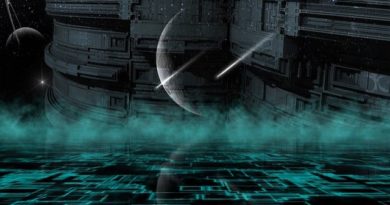For a Lack of Time
“The twitching,” Freeman said, looking pointedly at Dr. Philageous’ hands. “Borin’s Disease, am I right? Which is only treatable with the heavy narcotic, Carpaxyl. That one syringe holds, what, twenty doses? Enough for about three weeks, just in case? You’ll empty all of it into Professor Scala, and his eyes will close and he’ll… he’ll go to sleep.”
Philageous shook his head. “He’ll ‘go to sleep?’ What euphemistic detritus is this? This is a man’s life, Freeman!”
Thoroughgood shook his head. “Use your sense, Doctor. We’re in a time machine. We just set the thing to bring us back a couple of minutes before we left and prevent ourselves from going. It’ll save Professor Scala’s life and prevent this whole debacle from ever taking place.”
Dr. Freeman looked around at Dr. Philageous. “Is that possible?” he asked.
Philageous’ eyes made their customary track up to the top bulkhead as he began to consider, but Thoroughgood cut him off. “Of course, it’ll work,” he said. He turned to Professor Scala. “Besides, it’s Scala’s life that hangs on it working, and he trusts me. Don’t you, Professor?”
Professor Scala looked up at Thoroughgood standing in front of him. It was so strange to see the relatively little man standing over the lanky paleontologist, who was looking up at him silently, that same wordless communication passing between them. This time, it was much shorter ― only about forty seconds ― but the net effect was the same. Scala collapsed in on himself, looking away, squeezing a tear out of one eye by slamming both of them shut. “Yes,” he said, his voice barely audible.
Freeman glanced between Scala and Philageous, then looked back at Thoroughgood. “I don’t know about this.”
Thoroughgood turned and reached down to undo Philageous’ restraints. The old man ― he looked so much older, and this despite the lack of gravity which should have alleviated some of the lines on his face ― registered surprise as he floated free of his chair, but Thoroughgood caught him and kept him level with the deck. “I’m not hearing another option. Unless the doctor has a magical way of rebooting the engine sooner.”
Freeman, Thoroughgood, and I all looked at the doctor. Instead of looking back at us, he looked down at Scala, withdrawing the syringe from his pocket. He uncapped it, a little bit of liquid spraying out the top. It wasn’t an ordinary hypodermic needle ― it had been modified with a gauge and a little clip on the side. As I watched, the doctor clicked the clip, and it floated away. A safety, I realized. To prevent someone from doing exactly what we were planning to do ― inject someone with the full contents of the syringe.
Dr. Philageous was crying. “I’m sorry, Jeff,” he said, moving his hand down, the steel point of the needle pressing into Professor Scala’s skin. “We’ll make it right. I promise we’ll make it right.”
He kept muttering that until after he’d pushed the syringe’s plunger home, emptying the full contents of the syringe into Professor Scala’s neck.
When two hours had passed ― I’ve never watched that little stainless steel watch so closely in my life ― I keyed the ignition switch and felt the ship begin to hum to life. I glanced back into the cabin. They’d moved Professor Scala’s body to the back and covered it with Doctor Philageous’ lab coat. But of course, the tall professor was far too big to be covered entirely by it and, grotesquely, his legs from just below the cutoff of his shorts were poking out of the end.
“We’re ready to go,” I said, aware for the first time of how difficult it was to get the words out. It seemed oppressively stuffy in the cabin. “Doctor, I need you to help me reprogram the machine to bring us back a couple of minutes before we left.” The doctor didn’t move, just sat mumbling to himself, looking down at Scala’s body. “Doctor? Did you hear me? I need a hand up here. We only have a minute or so before the ship cycles up and we’re automatically taken back to just after we left.”
When the doctor still didn’t budge, I opened my mouth to repeat my request, but instead, Thoroughgood stood and pushed himself to stand beside me. “Don’t bother,” he said. “He’s not coming up. Can’t.”
“What?” I asked. “What about going back to before we left to fix this whole mess?”
Thoroughgood bit his lip. “Look, kid―”
I cut him off. “Don’t you ‘look, kid,’ me. I’m a grown man. Treat me like one.” I was aware of how young I must have sounded, but it was ― so ironically ― hardly the time to sit and come up with how my words were supposed to sound.
Thoroughgood released his lip. “Fine,” he said, shortly. “We can’t go back to before we left.”
“Why not?”
“A few reasons,” Thoroughgood said. “The doctor could probably explain it with more syllables, but I think I have the gist of it. First off, the whole problem is that coming back to this time landed us somewhere that the Earth isn’t. If we go back to even a few seconds before we left, who’s to say where the Earth would be, then? We might wind up buried in three hundred feet of bedrock. Or we might come out just slightly offset from where we were, and those kinetic whatsies the doc mentioned earlier would kill all of us. But that’s not the biggest problem.”
I was having trouble making my jaw work correctly. “What’s the biggest problem?”
“We’ve already been there,” Dr. Philageous said, from behind us. Thoroughgood nodded and pushed back into his seat to fasten his restraints. The cabin was starting to vibrate.
“I don’t understand!” I yelled. One of Professor Scala’s shoelaces was untied.
“A single moment in time only happens once,” Dr. Philageous said, his voice dead. He was still staring out the porthole. Out at a whole vast array of nothing. “All our understanding of the underlying physics of time confirm that. Since we’ve already experienced the departure of this machine from our time, we know what happens in that point in time, and we can’t change it. If we were to try, it would create a paradox, one that could very easily destroy the whole planet. There’s no way to tell how bad it would be in advance.”
I was crying. “I still don’t understand.”
Dr. Philageous craned his neck around to look at me. There was nothing behind his eyes. “We’ve already experienced the portion of time before our departure. If we’d gone back to warn ourselves not to come, we’d have experienced it then, because we’d be making the decision now ― sixty-five million years in the past ― to do so. Just because we had to leave in order to understand that leaving was a bad idea ― and in turn decide to prevent ourselves from leaving ― doesn’t mean that our departure happened before our decision to prevent ourselves from departing. In fact, it’s the other way around ― our departure happens after our decision to not prevent our departure, which we know because we’ve already seen that period of time.”
“That’s insane!” I yelled, no longer caring about the low levels of oxygen in the cabin. The vibration was drumming up to the point where it was getting difficult to hear. “If we can’t change the past, then how come we could travel into it?”
“Because, from time’s perspective, we already did travel into the past, and any repercussions of us doing so already exist in the future ― our present,” Dr. Philageous continued. “If anything had happened to the past as result of this trip, we’d have all grown up in a world created by the those consequences, because they already happened, technically. So in essence, we could have changed the past ― if it wasn’t too busy laughing at us.”
Thoroughgood shook his head. “Laughing at you, Doctor. I wonder how a case like Scala’s will be prosecuted? Murder, or assisted suicide? I doubt it’ll be pleasant, either way. Scala knew, if it makes it any easier on you,” he continued, directing his words at me. “When I looked into his eyes, I saw a man who knew he was going to die. I think Professor Scala was the smartest man here, in the end ― he knew that none of the rest of you would go, and he knew that if it came down to a struggle for life between us that I would win. And then, when we trotted out the comfortable lie that we could resurrect him through time travel, he saw through that, too.” Thoroughgood grinned, that same predator’s grin he’d given me before we’d left, and for a moment I legitimately wondered if he was the devil. “Only someone so obsessed with the past could have put all the pieces together that fast.”
“It doesn’t help,” I said. With a sick stomach, I turned back to the controls. As blinding light enveloped the windshield in front of me, my last thought was of how lonely it must have been to contemplate dying among vicious, irresponsible strangers ― of dying sixty-five million years away from the death of any other human being.
Daniel Loring Keating grew up in post-Industrial New England, where he earned a BA in Creative Writing from Chester College of New England. He is now an MFA candidate in Creative Writing at the California College of the Arts. His work has previously been published in Petrichor Machine and Obra/Artifact.
Featured image via Pexels, Public Domain, CC0




